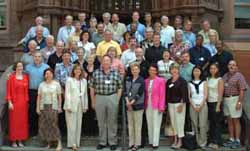The 62nd Annual Superintendents Work Conference Explores Effective Leadership
In this time of severe educational budget cuts, school superintendents nationwide are looking for answers on how best to lead their districts.
From July 13th to 16th, a group of approximately 50 school superintendents from across the country and two from schools in Thailand and Hungary met at Teachers College to strengthen their roles as leaders.
Tom Sobol, who is the Christian A. Johnson Professor of Outstanding Educational Practice and Director of the Superintendents Work Conferences, said that the leadership theme is more important now than in most years. "There is a widespread understanding that we cannot attain high standards by virtually all students without effective leadership," he said.
Speakers at the conference represented institutions that included the Columbia University History Department and School of Business, the National War College, WNET Channel 13 and the Chancellor's office of the New York City public schools. "Our premise is that superintendents and those who work with them have something to learn from all these people in various spheres of activity," Sobol said.
Alan Brinkley, Chairman of the History Department at Columbia University, presented an interesting discussion of the leadership styles of some of the U.S. Presidents, focusing mainly on Abraham Lincoln and FDR.
Diana Lam, Deputy Chancellor of New York City public schools, addressed the issues of race, class and gender and how it has impacted her experiences in school reform. In relating stories of the challenges she faced in San Antonio and Boston schools, she told the superintendents, "Race and class shape our expectations of students. To pretend a performance gap between white and minority students does not exist is not right." She added, "The idea that only some students can learn is undemocratic and racist and classist."
Bill Baker, President of WNET Channel 13, who has helped to shape American broadcasting in both the commercial and public sectors, spoke of his experience in both for-profit and not-for profit organizations. His advice to the conference attendees began, "As Michael Sovern, former President of Columbia University, once told me, the most important thing is the huge list of terrible things that didn't happen because you kept the institution out of trouble by the regular, mundane-but crucial-decisions you made that you never get any credit for."
He later added that there is room for error by saying, "It is also my theory that leaders are not born, not made, but mostly make themselves. They do that by trial and error and by making mistakes."
Aside from the speakers, Sobol also put together a panel of retired and soon-to-be retired superintendents who reviewed what they have done and learned over the past 20 to 30 years in service to the public schools.
"We need that stimulation of people who are doing exciting things, even beyond education, with something to say about leadership," said Marjorie Castro, who is superintendent in the Croton-Harmon school district in Westchester and who has attended one other Superintendents Work Conference at Teachers College.
"The annual Teachers College Superintendents Work Conference has become a national model of effective in-service for practicing superintendents and other key educational leaders," said Bruce Dennis, superintendent of the Bedford School District in Bedford, NY. "In addition to hearing from the top people in our own industry, Tom Sobol brings in first-rate leaders from outside education, who stimulate us to think about our own practice and see relationships to the world for which we are preparing our children."
Published Thursday, Mar. 3, 2005
